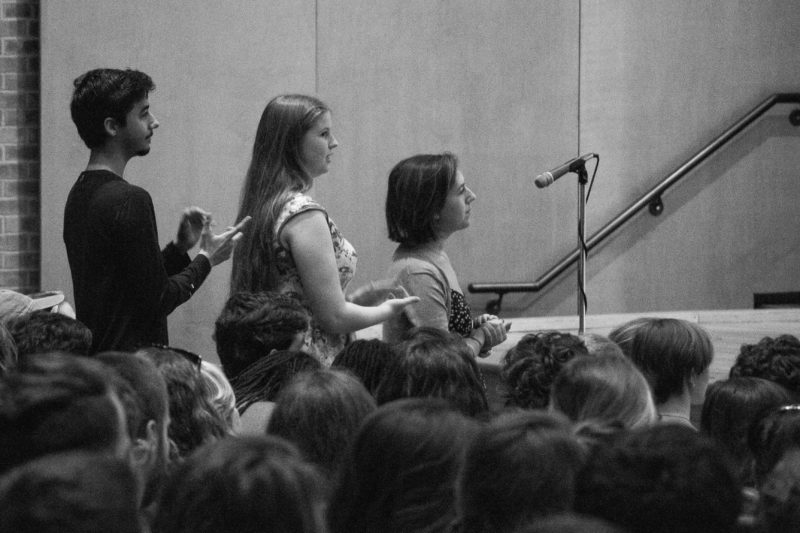At about 6:55 p.m, people started being directed to the overflow room, since every seat in the Ruth Taylor Recital Hall had been filled by an eager, talkative crowd. The stage was not set for a traditional lecture: instead of a podium or a lectern, there was a brown leather couch and a small coffee table. From this cozy setting, feminist essayist and writer Roxane Gay invited the audience to have a conversation.
Gay opened by reading a few stories from her latest collection, “Difficult Women,” which included playful anecdotes on open marriages and yogurt, as well as colorful vignettes about gated communities in Florida. Although Gay described herself as a fiction writer first, she is also a an opinion writer for The New York Times, a professor at Purdue University and a best-selling author for her essay collection “Bad Feminist.”
The tone of the talk changed after Gay read a separate essay entitled “The Age of American Disgrace,” which advised against believing pretty slogans like “Love Trumps Hate.” Last November, as Gay reminds us, it didn’t. “We need to get uncomfortable,” Gay said. “That means moving beyond tidy words that make us feel like the world is a better and more unified place than it actually is.”
Gay similarly disagreed with the one-sided call for liberals to attempt to understand the conservatism of rural America. “These people are not mysteries,” Gay said, “Our journalists and coastal people need a far stronger and more complex understanding of what happens in every other state but New York and California, and yet it is also on us in the more conservative states to understand what people in more liberal places are like.”
Roxane Gay believes that the words we use matter, and that racism should be met with ruthlessness and protest. She expressed her sadness at the fact that Michelle Obama’s motto of “When they go low, we go high” has turned into an excuse to not react to instances of discrimination. “When they go low, we have to go lower,” Gay said. “There can be no purity in fighting fascism.”
For the majority of the evening, Gay opened the floor to questions from the audience, which covered all kinds of topics, including sexuality and comics, but mostly veering towards activism. When asked about politically correctness, Gay suggested to look at actions. “Sometimes we see people using politically correct language but behaving in absolutely culturally incorrect, ethically incorrect ways,” Gay said. “Politically correct language only matters as far as people’s actions support that language. Otherwise it’s just playing a game.”
Gay had a few thoughts for those who are content with sharing articles on Facebook without following through with those ideas in their lives. “Are you doing the most you can do?” Gay said, “Are you taking a stance in your everyday life? Support community organizations, and if you can afford it, give money to organizations that are doing really good work, like the ACLU, Meals on Wheels any organization that is doing work with LGBT advocacy “” the list is very long.”
Organizers from the department of women and gender studies were thrilled by the success of the event. “I found it reassuring and informative to have somebody articulate in really meaningful accessible way why feminism is still important,” said Dr. Amy Stone, associate professor of English and co-director of the department of women and gender studies. “I think that we lose a lot when we think that feminism is white and middle class and something that happened a long time ago.”
“It was a huge honor to have her speak at Trinity, especially in the current campus political climate, which sometimes seems to be more about being inflammatory than about having an actual conversation,” said senior Robyn Wheelock, who introduced Gay’s lecture. “Roxane Gay was, as always, intelligent, hilarious, and honest. She expresses pride in regards to her own achievement, acknowledges the complications in the world around her as well as within herself and also admits that she doesn’t have all the answers.”
Despite the comfort of her seat, Roxane Gay is unafraid of getting uncomfortable, reminding the crowd that we too must have our own awkward talks. “You may not like the answers you get, but we have to have these conversations,” said Gay. “I want your fight. And I want to hear everyone’s voices.”







